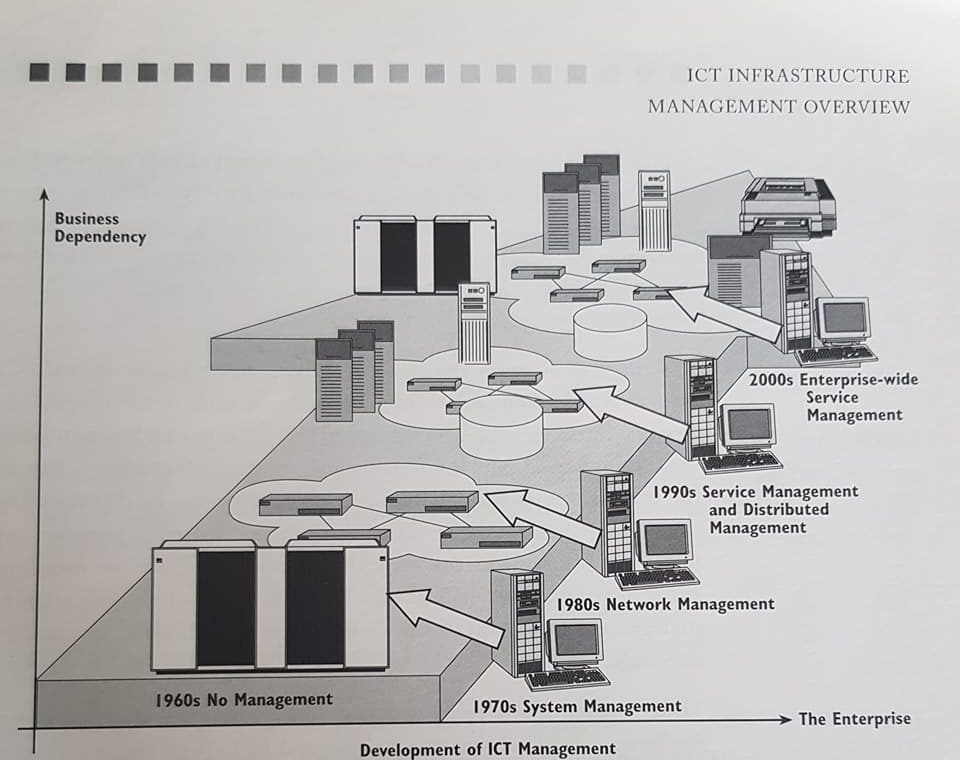
Email Eddie
How can we help?
Whether you're looking for expert ITSM consulting, cutting-edge technology solutions, award-winning training courses, or hands-on IT support, explore our website and use the search box to easily find the resources, insights, and services you need.
ICT Infrastructure Management
Effective Information and Communications Technology Infrastructure Management (ICTIM)
Knowledge and information are among the most valuable strategic resources any organisation can manage. The quality of Information and Communications Technology (ICT) systems is critical to the efficient collection, analysis, and dissemination of information throughout an organisation. For this reason, investing in the design, planning, and management of ICT systems is essential to maximise their value. Unfortunately, many organisations only address these aspects of ICT superficially, leading to missed opportunities and inefficiencies.

The Growing Importance of ICT Management
As ICT continues to evolve rapidly, organisations face increasing challenges in managing their ICT infrastructures. The introduction of more complex and sophisticated systems at ever-shorter intervals adds to the difficulty. ICT components are now widely distributed across organisations, making effective management both crucial and challenging. It is the responsibility of ICT Management to ensure that these distributed resources support Information Systems (IS) and facilitate decision-making while being managed as transparently as possible.
What is ICT Infrastructure Management (ICTIM)?
Information and Communications Technology Infrastructure Management (ICTIM) encompasses the processes, organisation, and tools needed to provide a stable IT and communication infrastructure. It forms the foundation for effective ITIL Service Delivery processes. Proper planning, administration, and control are key to building and maintaining information services that meet business needs in a cost-effective manner.
To ensure alignment with business goals, ICTIM must manage resources throughout their lifecycle, from infrastructure design and planning to deployment, operations, and technical support. This proactive management is increasingly important due to several factors:
- Dependency: Organisations are becoming more reliant on ICT for daily operations.
- Pervasiveness: ICT is now a critical channel for delivering products and services.
- Complexity: ICT infrastructures are growing in size, distribution, and complexity.
- Flexibility: Users demand new services that often need to be delivered using the existing infrastructure.
- Customer Satisfaction: Customers have become less tolerant of service failures, which can severely impact business functions.
- Investment: ICT represents a substantial portion of many organisations’ budgets, driving the need for long-term value realisation.
- Time to Market: Global competition and shorter technology lifecycles increase the pressure to deliver products and services quickly.
Aligning ICT with Business Strategy
The growing dependency on ICT necessitates strategic alignment between business goals and ICT planning. Effective communication between executives, such as the CEO and Chief ICT Officer (CIO), is essential to ensure that ICT strategies support the overall business direction. For this alignment to be successful, ICTIM must foster strong business partnerships and demonstrate improved project delivery.
Reducing the Total Cost of Ownership (TCO)
One of the key challenges for ICT Management is controlling and reducing the Total Cost of Ownership (TCO) of ICT infrastructure. TCO includes all resources and costs involved in deploying and supporting desktop computing, from hardware and software purchase costs to the hidden costs of supporting mainframes, databases, networks, and more. The goal is to reduce TCO while maintaining the quality of ICT services.
To achieve this, ICTIM must implement appropriate measures to monitor and control performance, ensure quality IT service provision, and demonstrate the business value attained through ICT investments. Service Level Agreements (SLAs) should be created with a clear understanding of the impact of ICT on customer services, ensuring that networks and other ICT services are fully integrated into service management.
Take Control of Your ICT Infrastructure
At Pink Elephant, we specialise in helping organisations optimise their ICT Infrastructure Management to align with business goals, reduce costs, and enhance service quality. Contact us today to learn how we can support your ICTIM needs and drive your business forward.
Case studies

Rapid results: a new ITSM Platform in 54 days
When Ivanti announced the end of life for Cherwell, SCS JV faced an urgent challenge. More than a service-management tool, Cherwell provided crucial identity and access management for the project, controlling who could see sensitive project data across 22 live construction sites. With more than 2,100 project staff and between...

Growth powered by Pink Elephant’s SIAM IT Service Desk
Corplex (formerly DS Smith Plastics, Extruded Products) is a leading manufacturer of innovative reusable packaging. With a history spanning 50 years, Corplex rebranded in 2020 after being acquired by Olympus Partners. The company is dedicated to sustainability and excellence, establishing itself as a trusted name in the Reusable Transport Packaging...

Bespoke Customer Service training programme for GTT
Pink Elephant EMEA builds on the success of a GTT’s customer service offering with a bespoke virtual training programme. Find out more below about the objectives, challenges, and successes of delivering a training programme to 250+ GTT employees, in three countries, across three time zones. Find Out More about Customer...